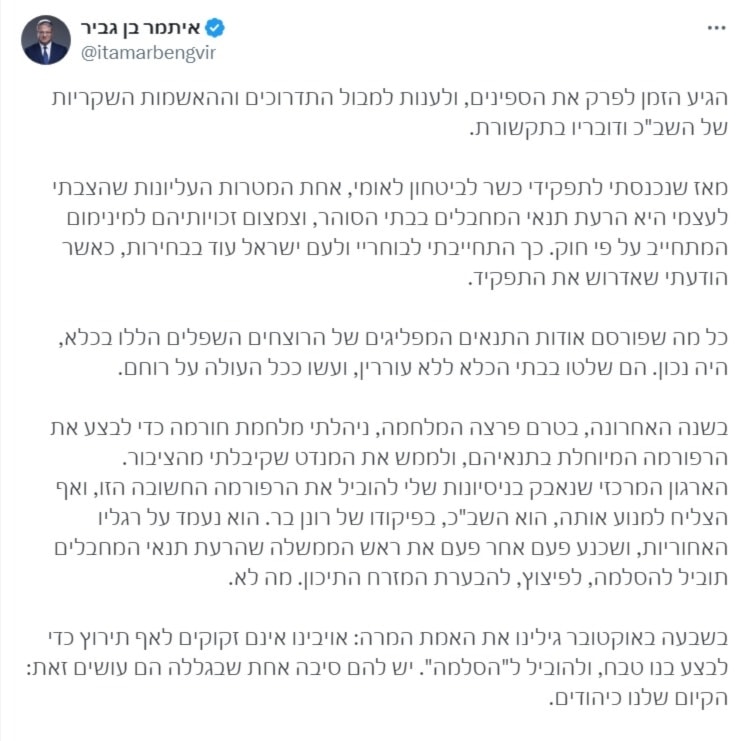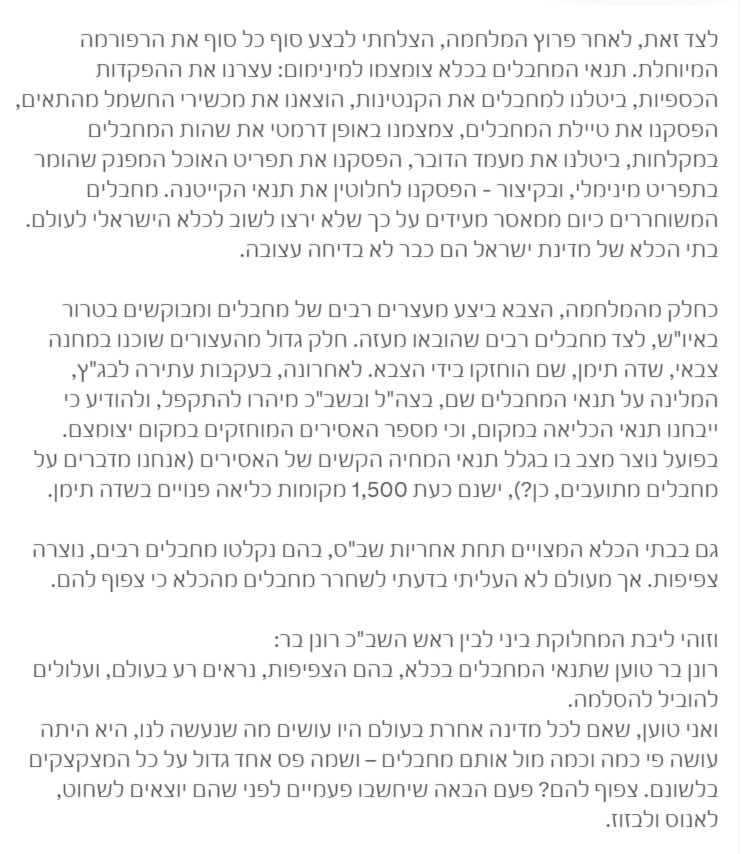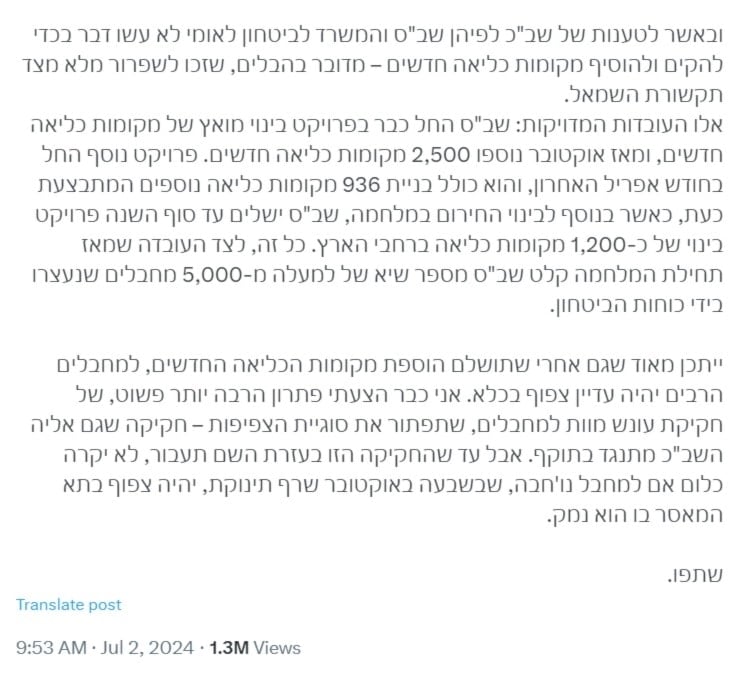Ben-Gvir confirms atrocities faced by Palestinians in Israeli prisons
Israeli Police Minister Itamar Ben-Gvir confirms the reports saying Palestinians are suffering atrocious circumstances in Israeli prisons and pushes for even harsher treatment.
-

Palestinian detainees released by Israeli occupation forces through the Karam Abu Salem crossing wait to receive treatment after they were subjected to torture by IOF on December 23, 2023 (AP)
Israeli Police Minister Itamar Ben-Gvir confirmed Tuesday's reports of the atrocious conditions being faced by Palestinian prisoners and defended the legitimacy of such measures. He emphasized that these steps were part of his campaign promises and aimed at minimizing the rights of Palestinians detained over alleged "terrorism" charges to the bare minimum allowed by law.
"Since assuming my role as [Police] Minister, one of my top priorities has been to worsen the conditions for terrorists in prisons and reduce their rights to the minimum required by law," Ben-Gvir said. "This was a commitment I made to my voters and the people of Israel during the elections when I announced my intention to take on this role."
-

Israeli Police Minister Itamar Ben-Gvir's post on X -

Israeli Police Minister Itamar Ben-Gvir's post on X -

Israeli Police Minister Itamar Ben-Gvir's post on X
Over the past year, before the outbreak of the war on Gaza, Ben-Gvir claimed to have led a fierce battle to make the conditions even stricter for Palestinian prisoners and inflict more terror upon them
Following the outbreak of the war, Ben-Gvir declared success in implementing his desired sadistic changes. "The conditions for terrorists in prison were reduced to a minimum: we stopped financial deposits, canceled the canteens, removed electrical appliances from the cells, ended yard times for terrorists, drastically reduced their time in the showers, revoked the spokesperson status," and made dire restrictions to their diet, he said.
Overcrowded? Not Ben-Gvir's problem
Additionally, Ben-Gvir addressed the current overcrowding in prisons due to the detention of wanted Palestinians in the West Bank and Gaza. He mentioned a specific military camp, Sde Teiman, where many detainees were held under harsh conditions.
As a matter of fact, two Palestinian detainees taken from Gaza to the Sde Teiman detention facility in occupied Palestine were beaten to death by the IOF, according to what two sources told the Israeli newspaper Haaretz.
The two Palestinians were abducted by IOF troops in March from Khan Younis using the pretext that they were suspected members of the Palestinian Resistance. When they were taken, they were still alive, and the IOF strapped them and put them in a truck.
However, when they arrived at Sde Teiman, a temporary IOF detention facility near Be'er Shevam, they were already dead.
The IOF troops, unharmed, claimed that the two Palestinians possibly died due to the "extremely bumpy ride over rough terrain," however, the investigation's conclusions contradict these claims.
Read More: Harrowing tales of torture inside 'Israel's' Sde Teiman prison: NYT
Two journalists from The New York Times spent three months interviewing Israeli soldiers who worked at Sde Teiman and Palestinians detained there. One of the journalists visited the site, providing additional insight into "Israel's" policy of systematic torture and abuse since October 7.
Despite the overcrowding, Ben-Gvir stated, "I have never considered releasing terrorists from prison because it is crowded for them."
This comes mere days after Ben-Gvir appeared in a video clip calling for the implementation of the death penalty for prisoners and shooting them in the head instead of giving them food, in response to accusations of practicing a policy of starvation in Israeli prisons.
Palestinian detainees in Israeli prisons face malnourishment: Haaretz
A report by the Israeli newspaper Haaretz has revealed that the Israeli occupation's Prison Service has been concealing the actual quantities of food provided to Palestinian detainees held in Israeli occupation prisons since the launch of Operation Al Aqsa Flood.
The revelation came to the forefront following a petition by the "Association for Civil Rights in Israel" (ACRI), which has brought this critical issue before the High Court of Justice, raising serious questions about the conditions under which these Palestinian detainees are being held.
According to the Israeli occupation's Police Minister, Itamar Ben-Gvir the reduction in food supplies was implemented as a deterrent measure. However, this stance was not included in the official response to the court.
Ben-Gvir, in a statement, claimed, "There is no starvation, but my policy does call for reducing conditions, including food and calories."
For months, Palestinian detainees have been released from Israeli occupation prisons, showing signs of significant weight loss and its severe effects on their physical and mental health.
At the same hearing, Israeli settlers who are relatives of those who settled in the Gaza Envelope and faced Operation Al Aqsa Flood voiced their support for stricter conditions for Palestinian detainees.
For example, Herzl Hajaj made a pointed statement in court, calling for the slow death of Palestinian detainees through famine and medical negligence noting, "You should be representing us. You should be defending Israeli citizens and not terrorists."
Read next: Released Palestinian detainees recount horrors in Israeli jails
UN reports implicate 'Israel'
A UN commission examining human rights breaches in the occupied Palestinian territories accused Israeli occupation forces (IOF) Tuesday of raping, degrading, and dehumanizing Palestinian men, women, and children in their custody.
The statement explained that "Multiple stakeholders reported a stark increase in sexual harassment, sexual abuse, the threat of rape, and rape itself, including with foreign objects, against men, women, and even children, as well as intimidation through the use of dogs."
The Special Committee to Investigate Israeli Practices Affecting the Human Rights of the Palestinian People and Other Arabs in the Occupied Territories declared its members were "shocked" by the degree of impunity of the IOF who committed dreadful violations of Palestinian rights.
According to the committee, they are "publicly and shamelessly sharing photos on social media platforms that violate the privacy and intimate sphere of Palestinian women, aimed to mock, shame, and humiliate them."
In March, an internal report by the UN Relief and Works Agency for Palestine (UNRWA) detailed the violence against Palestinian detainees in Israeli detention centers, such as beatings, dog attacks, extended use of stress positions, and sexual assault.

 6 Min Read
6 Min Read








